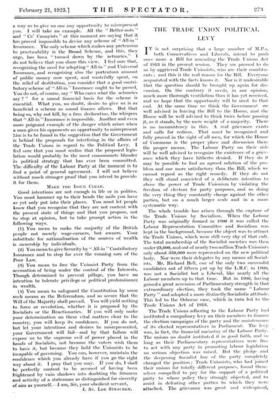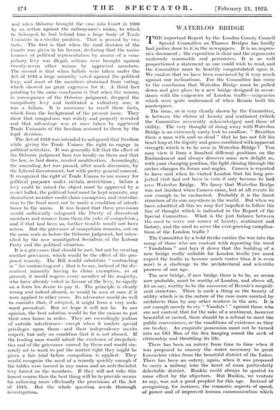THE TRADE UNION POLITICAL LEVY
IT is not surprising that a large number of M.P.s, both Conservatives and Liberals, intend to push once more a Bill for amending the Trade Unions Act of 1913 in the present session. They are pressed to do so by aggrieved Trade Unionists, who arc their constitu- ents ; and this is the real reason for the Bill. Everyone acquainted with the facts knows it. Nor is it undesirable that the question should be brought up again for dis- cussion. On the contrary it needs, in our opinion, much more thorough ventilation than it has yet received, and we hope that the opportunity will be used to that end. At the same time we think the Government ire well advised in leaving the Bill to the House, and the House will be well advised to think twice before passing it, as it stands, by the mere weight of a majority. There is no inconsistency in this. A real grievance exists and calls for redress. That must be recognized and fully proved_ in the sight of all men, for which the House of Commons is the proper place and discussion there the proper means. The Labour Party on their side will be well advised to recognize the existence of a griev- ance which they have hitherto denied. If they do it may be possible to find an agreed solution of the pro- blem and one more satisfactory than the Bill, which we cannot regard as the right remedy. If they do not they will stand convicted of a deliberate intention to abuse the power of Trade Unionism by violating the freedom of electors for party purposes, and so doing the very thing they constantly charge against the other parties, but on a much larger scale and in a more systematic way.
The whole trouble has arisen through the capture of the Trade Unions by Socialism. When the Labour Party was originally formed in 1900 it was called the Labour Representation Committee and Socialism was kept in the background, because the object was to attract the Trade Unions, which were still very shy of that cult. The total membership of the Socialist societies was then under 23,000, and out of nearly two million Trade Unionists only about 350,000 were represented on the new political body. Nor were their delegates by any means all Social- • ists. Mr. Richard Bell, ene of the only two successful candidates out of fifteen put up by the L.R.C. in 1900, was not a Socialist but a Liberal, like nearly all the Labour members up to that time. But in 1906, having gained a great accession of Parliamentary strength in that extraordinary election, they took the name " Labour Party " and adopted a more distinctly Socialistic attitude. This led to the Osborne case, which in turn led to the Trade Unions Act of 1913.
The Trade Unions adhering to the Labour Party had instituted a compulsory levy on their members to finance the election campaigns of the party and the maintenance of its elected representatives in Parliament. The levy was, in fact, the financial mainstay of the Labour Party.
The unions no doubt institutcd it in good faith, and so long as their Parliamentary representatives were free to act with any party in promoting labour legislation no serious objection was raised. But the pledge and the deepening Socialist hue of the party completely changed the position ;. Trade Unionists, who had joined their unions for totally different purposes, found them- selves compelled to pay for the support of a political party to whose policy they strongly objected, and to assist in defeating other parties to which they were attached. The grievance was great and widespread, and when Osborne brought the case into Court in 1908 by an action against the railwaymen's union, to -which he belonged, he had behind him a large body of Trade Unionists in a similar position. That is proved by two facts. The first is that when the final decision of the Courts was given in his favour, declaring that the main- tenance of political representation by means of a com- pulsory levy was illegal, actions were brought against twenty-seven other unions by aggrieved members. The second is that when ballots were taken under the Act of 1913 a large minority voted against the political levy, and most of the members abstained from voting, which showed no great eagerness for it. A third fact pointing to the same conclusion is that when the unions, in consequence of the Osborne judgment, dropped the compulsory levy and instituted a voluntary one, it was a failure. It is necessary to recall these facts, which form the background of the present issue. They show that compulsion was widely and properly resented and that advantage was at once taken by aggrieved Trade. Unionists of the freedom restored to them by the legal decision.
The Act of 1913 was intended to safeguard that freedom while giving the Trade Unions the right to engage in political activities. It was generally felt that the effect of the Osborne judgment bore too hardly on them and that the law, as laid down, needed modification. Accordingly, the amending Act was passed, after much discussion, by the Liberal Government, but with pretty general consent. It recognized the right of Trade Unions to use money for political purposes under certain restrictions ; before a levy could be raised the object must be approved by a secret ballot, the political fund must be kept separate, any dissentient member could claim exemption, and contribu- tion to the fund must not be made a condition of admit- tance to the union. It was hoped that these provisions would sufficiently safeguard the liberty of dissentient members and remove from them the yoke of compulsion ; and if that had been so, further trouble would not have arisen. But the grievance of compulsion remains, not on the same scale as before the Osborne judgment, but inten- sified by the now unmitigated Socialism of the Labour Party and the political situation.
It is a grievance that should be met, but not by creating another grievance, which would be the effect of the pro- posed remedy. The Bill would substitute " contracting in " for contracting out ; that is to say, instead of the dis- sentient minority having to claim exemption, as at present, it would require every member of the majority, who have already voted in favour of the levy, to signify on a form his desire to pay it. The principle is clearly wrong and indeed absurd, as would be seen at once if it were applied to other cases. Its advocates would do well to consider that, if adopted, it might form a very awk- ward precedent. But we hope it will not be. In our opinion, the best solution would be for the unions to put their own house in order. They are exceedingly jealous of outside interference— except when it confers special - privileges upon them—and their independence merits respect, but only on condition that it is not abused. If the leading men would admit the existence of irregulari- ties and of the grievance caused by them and would sin- cerely set to work to put. the matter right they might be given a fair trial before compulsion is applied. They would recognize the need of a remedy quickly enough if the tables were turned in any union and an anti-Socialist levy forced on the members. If they will not take this honest course then the best thing will be to provide means for enforcing more effectually the provisions of the Act of 1913. But the whole question needs thorough investigation.











































 Previous page
Previous page